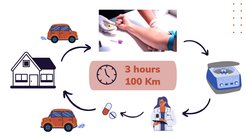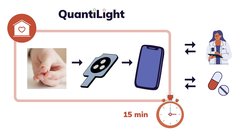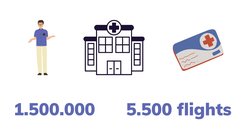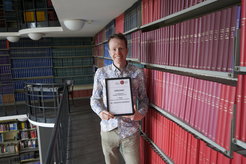QuantiLight wins hei_INNOVATION idea competition at first IMPACT DAY
Researchers Corentin Gondrand and Estelle Bonedeau inspire the jury with their solution for portable, at home blood testing for patients
Designing blood tests for patients with chronic diseases that they can do from home – this idea was awarded the first prize in the social innovation category at the first Heidelberg University IMPACT DAY in May. The project is pursued at the Max Institute for Medical Research by Corentin Gondrand and Estelle Bonedeau as QuantiLight and aims at developing a simple solution for portable blood tests that not only benefit the patients but care-givers and the society as a whole.
Here is a look into the pitch Corentin Gondrand gave at the competition:
The problem

Max received a kidney transplant last year after having serious issues all of his life. He finally lives a normal life, but there is a catch: he has to take drugs every day. If he takes too much, he can have severe side effects. Too little, and he risks to lose his graft. For Max, having the right dose is crucial. Therefore, he has to go to the hospital every week, to get his blood tested to adjust his medication. The nurse takes his blood and sends it to the lab. They have to run the test, send the results back and the doctor will adjust the drug dose. He drives 100 km in total and loses three hours of work time for the trip. Couldn’t Max get a result as good as the clinic’s one but faster and without leaving his home?
The solution

The idea behind QuantiLight:
The researchers are developing a test simple enough that Max could do it himself. From a finger prick, he transfers a drop of blood onto a test. This test is read by his phone camera. An app calculates the result and transfers it to his doctor automatically. 15 minutes is what takes for Max to know his new dose. All from his living room.
The benefit

Using such a blood test would bring several benefits. Max could save time and money spend on commuting back and forth to the hospital. The hospital and health insurance would also save time and money they could spend on other patients. But this problem does not only affect Max but hundreds of thousands other patients worldwide. It would therefore save society time and money as well.

“We feel honored that the idea was recognized as social innovation and hope that our win will help spread the word about our solution and turn the idea into reality”, says Corentin Gondrand after receiving the award.
The prize comes with a 5.000 Euro award to support the idea and further pursue the project.
Further information on the idea competition: https://www.uni-heidelberg.de/de/transfer/heiinnovation/ideenwettbewerb



